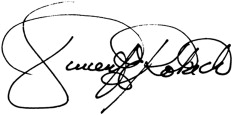I will never forget how impressed I was with the caliber of the faculty who taught in my orthodontic residency. Some of these people were directors of the American Board of Orthodontics. Some were regarded as leading researchers in orthodontics. Others were presidents of our constituent or state component. One was even the president of the American Association of Orthodontists. In fact, some of my teachers had been closely associated with the legendary personalities who had shaped the early specialty of orthodontics. As a graduate student, I was humbled to be in their presence. These people were my role models. I wanted to become just like them when I completed my orthodontic training.
This feeling was so strong that when I began my private practice and had to make decisions regarding a specific mode of treatment, or the extraction or nonextraction of teeth, I would often wonder “what would my instructor do in this situation.” And when the time came to deband my first completed patient, I almost had the feeling that my instructors were watching over my shoulder. I certainly did not want to disappoint them by producing a less-than-ideal result. During my orthodontic career, having good, positive role models shaped my professional life.
As time went on and these people, whom I respected and idolized, gradually passed away, I eventually found myself wondering, “where are all the great orthodontic role models?” It was then that I realized that an evolutionary change had occurred. With the passing of these pillars of the profession, my generation of orthodontic practitioners stood in their place as role models for the younger orthodontists who would follow in our footsteps. This is a sobering thought. Eventually, we all become role models for others.
When does one assume the responsibility of being a role model? Actually, this responsibility does not begin in adulthood. When I look at our family of 4 children, 7 grandchildren, and many nieces and nephews, I can see role modeling occurring at even the youngest ages. For example, our 13-year-old granddaughter is a role model for her 6-year-old sister, who absolutely idolizes her older sister. In turn, her father and mother are role models for their 4 children as well as their 4 nieces and nephews. The responsibility for being a role model begins at a very young age and endures for a lifetime.
Think back to your orthodontic training. As an orthodontic resident, you were envied and respected by the new applicants who were invited to interview at your orthodontic program. As a first-year resident, you probably looked up to the second- or third-year residents, who seemed to know so much more than you could ever imagine learning about orthodontics. When you entered private practice, you probably had a vision of what you expected to accomplish during your orthodontic career, but that expectation was most likely based upon 1 or 2 practitioners who impressed you with their attitude about the specialty and the way they managed their patients and their practices.
However, there is a significant difference between a good role model and a poor role model. Nearly every decision that we make in our personal and professional lives eventually influences the lives and opinions of those around us. Actually, being a good role model for others might be one of the greatest social, parental, and human responsibilities in life.
How should we handle this responsibility? As orthodontists, we must make the appropriate decisions regarding patient treatment, practice management, parenting, spouse interaction, and all of the other activities in which we are involved on a daily basis. It’s not easy. But if you are a good role model for the people with whom you interact, your rewards will come daily as you see the people who respect and depend on you eventually become positive role models for the next generation.
So, the next time you’re thinking to yourself, “where are all the great role models whom I had as a young orthodontist?” walk over to the nearest mirror and take a good look at yourself. What kind of role model are you?





